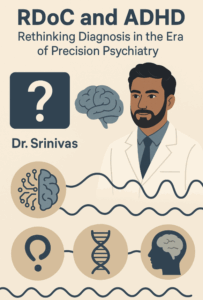RDoC and ADHD: Rethinking Diagnosis in the Era of Precision Psychiatry
 What is RDoC?
What is RDoC?
RDoC (Research Domain Criteria) is a research framework developed by the U.S. National Institute of Mental Health (NIMH). It was created as an alternative to traditional categorical diagnostic systems like the DSM and ICD, which define mental disorders as discrete conditions based on clusters of symptoms.
Key features of RDoC:
-
Focuses on dimensions of behavior and biology, rather than diagnostic labels.
-
Emphasizes underlying brain circuits, genetics, cognition, and developmental processes.
-
Encourages cross-cutting research that integrates neuroscience, behavioral science, and computational tools.
RDoC is organized into six domains:
-
Negative Valence Systems – fear, anxiety, loss
-
Positive Valence Systems – reward, motivation
-
Cognitive Systems – attention, working memory, cognitive control
-
Social Processes – attachment, perception of others
-
Arousal/Regulatory Systems – sleep, alertness
-
Sensorimotor Systems – movement initiation and inhibition
Each domain includes constructs (like attention or reward learning), which are studied dimensionally—how much of a trait someone has—rather than whether they have a disorder.
Why RDoC Matters in ADHD
Traditional ADHD diagnosis (e.g., DSM-5) focuses on:
-
Inattention
-
Hyperactivity
-
Impulsivity
However, ADHD is highly heterogeneous:
-
Some individuals mainly struggle with focus and organization.
-
Others are impulsive, emotionally dysregulated, or overly sensitive to reward or punishment.
-
Many have overlapping traits with anxiety, autism, or mood disorders.
This is where RDoC offers a better lens. Instead of asking “Does this person have ADHD or not?”, RDoC asks:
-
What is the person’s profile across multiple brain-based domains?
-
How do they perform in areas like cognitive control, reward responsiveness, arousal, or emotion regulation?
-
Can we use this information to predict treatment outcomes?
ADHD Through the RDoC Lens
| RDoC Domain | Relevant Construct | How it relates to ADHD |
|---|---|---|
| Cognitive Systems | Attention, working memory, cognitive control | Core deficits in ADHD. fMRI and EEG studies show altered activation in frontoparietal and prefrontal areas. |
| Positive Valence Systems | Reward anticipation, delay discounting | Many individuals with ADHD prefer immediate rewards, struggle with delayed gratification. Implicated in dopamine pathway alterations. |
| Arousal/Regulatory Systems | Arousal, sleep-wake cycles | ADHD often co-occurs with sleep problems, sluggish cognitive tempo, or underarousal. |
| Negative Valence Systems | Frustrative nonreward, anxiety | Emotional dysregulation and rejection sensitivity are common but under-recognized ADHD features. |
| Sensorimotor Systems | Response inhibition | Hyperactivity and impulsivity are linked to impaired motor inhibition circuits. |
RDoC encourages us to study these traits across the population—not just in “ADHD vs. control” comparisons—but dimensionally across all people.
Machine Learning, RDoC, and ADHD
Machine learning (ML) fits naturally with the RDoC model:
-
ML can analyze large, complex datasets—brain scans, behavior, genes, digital phenotyping.
-
It doesn’t require predefined categories like “ADHD” or “non-ADHD.”
-
Instead, it can find patterns and subtypes based on shared traits across RDoC domains.
Example:
-
An ML model may find a cluster of individuals with low reward sensitivity + high impulsivity + intact working memory.
-
Another group may show high emotional reactivity + poor sleep + impaired attention.
These data-driven subtypes may respond differently to medications or therapy—even if they all meet criteria for “ADHD” under DSM.
Implications for Treatment
Current limitations:
-
Trial-and-error treatment approaches
-
Same medication given for all ADHD types
-
Limited prediction of who will benefit or struggle with side effects
RDoC-guided, ML-informed psychiatry can help:
-
Tailor treatment based on an individual’s profile across RDoC domains
-
Predict whether stimulant, non-stimulant, or behavioral therapy is more effective
-
Identify early risk for poor response or adverse effects
Conclusion
RDoC reframes ADHD not as a fixed disorder, but as a constellation of interacting brain systems—some overactive, some underactive. Combined with machine learning, this framework offers powerful tools to:
-
Clarify ADHD’s heterogeneity
-
Personalize treatment
-
Improve long-term outcomes
As a clinician, incorporating RDoC principles doesn’t mean abandoning clinical judgment—but rather augmenting it with insights from neuroscience and data.
👨⚕️ About Dr. Srinivas Rajkumar T
Dr. Srinivas Rajkumar T, MBBS, MD (Psychiatry)
Consultant Psychiatrist
Apollo Clinics Velachery & Tambaram, Chennai
Trained at AIIMS, New Delhi, Dr. Srinivas specializes in neurodevelopmental and cognitive disorders, with a focus on ADHD, emotional regulation, and behavioral health across the lifespan. He integrates traditional psychiatric practice with emerging tools like fNIRS, EEG, and machine-learning guided assessments for personalized mental health care.
📞 Let’s Build a Personalized Plan for Your ADHD Journey
If you’re struggling with ADHD or want to understand your unique cognitive and emotional profile better, I offer evidence-based, individualized care using a combination of:
✔️ Clinical expertise
✔️ Neurocognitive testing
✔️ Non-invasive brain assessments (EEG/fNIRS)
✔️ Medication guidance with predictive insights
✔️ Psychotherapy and behavioral strategies
📍 Available at Apollo Clinic, Velachery & Tambaram
📞 Call/WhatsApp: +91-85951 55808
🌐 Visit: www.srinivasaiims.com
🩺 Online Consults Available
Let’s move beyond labels—and treat the person behind the diagnosis.